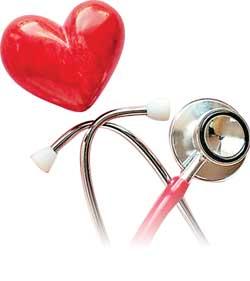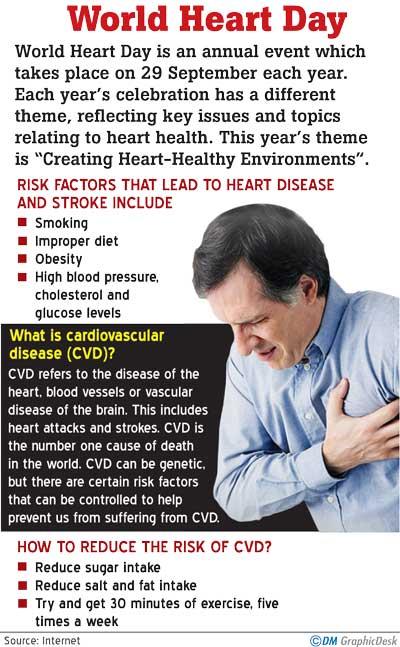Reply To:
Name - Reply Comment
The waiting time for a coronary angiogram is one year and for a bypass surgery, it is now over a year and some provinces do not have the facilities at the moment
 World heart day, which falls on September 29, is a day of great importance that aims in spreading awareness on prevention of cardiovascular diseases that are abundant in the world. Since heart diseases are quite serious and can barge into your life unexpectedly, it is important that people make it their responsibility to follow preventive measures and lead a heart-healthy lifestyle.
World heart day, which falls on September 29, is a day of great importance that aims in spreading awareness on prevention of cardiovascular diseases that are abundant in the world. Since heart diseases are quite serious and can barge into your life unexpectedly, it is important that people make it their responsibility to follow preventive measures and lead a heart-healthy lifestyle.

Our entire body depends on the heart to gain its nutrients and oxygen. It also helps with the transportation of waste and keeps us up and running. However, most people tend to be ignorant towards heart care, neglecting the fact that the price to pay will be your life.
According to Consultant Cardiologist Doctor Chandrike Ponnamperuma,the main cardiovascular disease that is constantly victimizing people in the world is the ‘Coronary artery disease’ that causes the narrowing or blockage of the coronary arteries. In addition to that, he mentioned that the ‘Valvular heart disease’ caused due to childhood rheumatic fever is also widely seen in Sri Lanka.
“These two cardiovascular diseases are the main entities that can be seen in Sri Lanka. Diabetes, hypertension, dyslipidemia and smoking are the main modifiable risk factors for them. Other important modifiable risk factors include; stress, stroke, obesity, underweight and malnutrition. Obstructive sleep apnea, a condition that causes excessive snoring at night leads to the interruption of respiration during sleep causing change in blood pressure is also a risk factor in focus.

Age, male gender and people whose families have had a cardiovascular disease history are also at higher risk of falling victim to heart disease,” Dr Ponnamperuma stated. “Many South East Asians have narrow coronary arteries. Therefore, the incidence of coronary artery disease is high in this region.”
Dr. Ponnamperuma explained that coronary artery disease leads to many fatalities including myocardial infarctions which reduces the efficiency of the heart. It can further cause cardiac valvular dysfunction, reducing the efficacy of the heart as a pump. While the heart has a normal pump efficiency of 50%- 70%, this can be reduced due to coronary artery disease.
TIPS TO KEEP YOUR HEART HEALTHY
It is vital for one to follow measures to improve cardiovascular health and maintain a healthy heart in order to lead a healthy lifestyle. Dr. Ponnamperuma stated that the population at risk for cardiovascular diseases should be identified and cared for. People with a family history of heart diseases, diabetes, hypertension, dyslipidemia and smoking should be prompted to control their risk factors and stay aware at all times.
“The whole population, whether at risk or not, should adapt to healthier behavioural patterns from childhood. They should follow a healthy diet and engage in regular exercise,” he said.
Smokers should understand the risks of smoking and participate in counselling to assist them in quitting the habit.
Dr. Ponnamperuma advised people at risk to receive regular blood pressure, blood sugar and lipid level checkups in order to discover any symptom at an early stage. He further recommended engaging in aerobic exercise in which one should exercise at an intensity where a conversation can be maintained with minor interruptions with a colleague while performing the exercise.
Recommended exercises include brisk walking, jogging, cycling and swimming. For healthy individuals, it is recommended to perform 40 minutes of such exercise at a stretch, at least 4 days a week.
SITUATION IN SRI LANKA
According to Dr. Ponnamperuma, the public health service in Sri Lanka is oversaturated by the number of patients when it comes to tertiary cardiac care and most of the population does not have timely access to tertiary cardiac care.
“The waiting time for a coronary angiogram is one year and for a bypass surgery, it is now over a year and some provinces do not have the facilities at the moment,” he mentioned. “While the government health services should improve to cater to a larger number, it would be helpful if there is a health insurance system, to get these services in the private sector in a timely manner, at least for the working population.”
The disease burden is extremely high that prevention of such diseases should be the main focus and should also be included in the school curriculum.